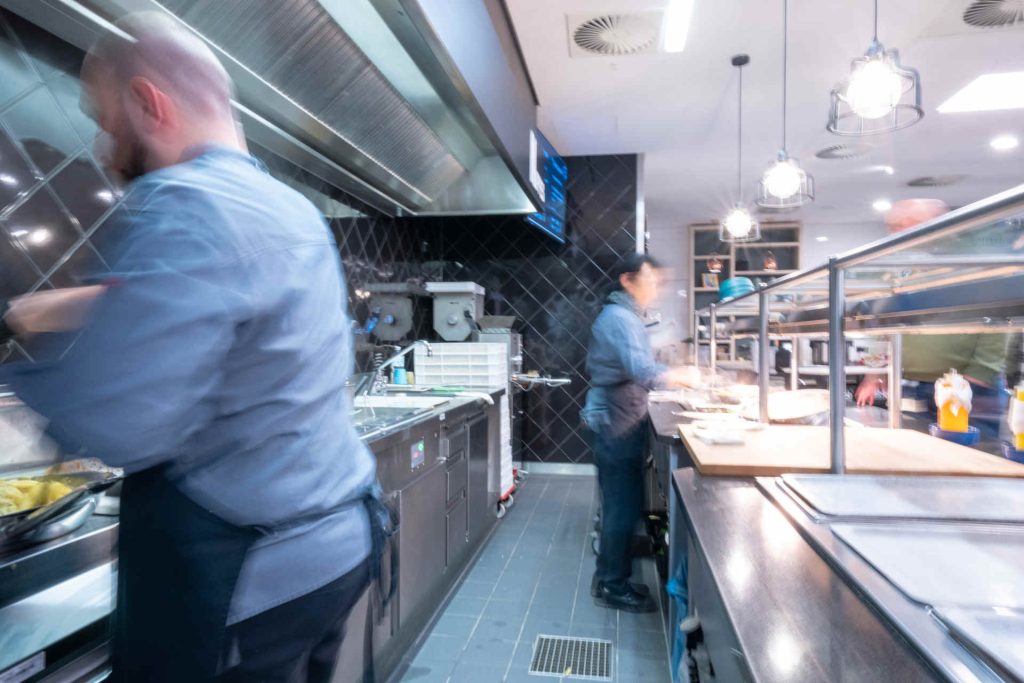
Intelligent cooking systems, resource-saving water technologies and well thought-out processes: new studies and practical examples show how digitalization and sustainability go hand in hand in professional kitchens. What the industry can learn from this – and why investing in smart systems is worthwhile.
The results of the practical study “Increasing the efficiency of commercial kitchens”, carried out by Weihenstephan-Triesdorf University of Applied Sciences together with Rational, speak for themselves: modern kitchen technology not only saves water and energy, but also improves the quality of the food and the working conditions for staff.
The study focused on the kitchen conversion of AXA Konzern AG in Cologne. The use of intelligent cooking systems such as the iVario Pro and iCombi Pro as well as the ConnectedCooking digital management system made it possible to achieve remarkable savings.
“For example, water consumption was reduced by 47.9%”, emphasizes study director Prof. Dr. Michael Greiner. The energy saving of 24.1% was also significant, despite the additional blast chiller. A key result: it's not the connected load that counts, but efficient operation - power peaks were reduced by 20.5%, which lowers energy costs in the long term.
In addition to ecological and economic factors, the perspective of the employees was also taken into account. Height-adjustable cooking systems and an optimized production model (e.g. cook & chill process) ensure ergonomic working and relieve the team through better planning. Food quality increases - not least because food no longer has to be kept warm for hours. “Modern technology makes everyday work easier and makes kitchen jobs more attractive - a real advantage in view of the shortage of skilled workers”, says Greiner.
The hotel sector also shows how innovation and sustainability can go hand in hand. The voco Brussels City North Hotel relies on water-saving faucets from hansgrohe combined with the intelligent gray water recycling system from Hydraloop. With success: around 1.2 million liters of water are saved there every year.
The EcoSmart technology ensures that mixers and showers significantly reduce water consumption - while maintaining the same level of comfort. At the same time, the shower waste water is treated using Hydraloop technology and reused for toilet flushing.
“By combining water-saving technology with a well thought-out recycling concept, we can unite sustainability and design,” explains Hotel Manager Steven Vandevelde. An approach that has been rewarded with the Green Key certificate for sustainability - and can serve as a role model for the industry.
Whether in commercial kitchens or hotel bathrooms - the way to greater sustainability is through intelligent technologies and well thought-out processes. The examples show impressively that investing in smart kitchen appliances, water recycling and energy-efficient systems not only pays off ecologically, but also economically. For the industry, this means that those who modernize now not only strengthen their future viability, but also their attractiveness as an employer and guest satisfaction.

With “Zukunftsküche – Nachhaltigkeit als Erfolgsrezept für die Gastronomie”, Balázs Tarsoly not only serves up a specialist book, but also a powerful appeal to the entire industry: sustainability is not a trend – it is the foundation of future-proof gastronomy. Those who act today will not only cook better tomorrow, but also more successfully.
Info:
Balázs Tarsoly – Future cuisine. Sustainability as a recipe for success in gastronomy
dfv Deutscher Fachverlag GmbH
1st edition 2025
ISBN 978-3-86641-361-0
304 pages
www.brandingcuisine.com
The award ceremony for the World’s 50 Best Restaurant 2025, presented by S.Pellegrino & Acqua Panna, was not only a lavish celebration of top cuisine, but also a clear statement: fine dining is at a crossroads – and is becoming more political, more conscious, more future-oriented.
Germany is shining brighter than ever: two new three-star restaurants were honored at the Michelin Guide 2025 awards ceremony at the Gesellschaftshaus Palmengarten in Frankfurt. The German gastronomy landscape now has a total of 341 starred addresses – a new record. Sustainability is also playing an increasingly important role.


Intelligent cooking systems, resource-saving water technologies and well thought-out processes: new studies and practical examples show how digitalization and sustainability go hand in hand in professional kitchens. What the industry can learn from this – and why investing in smart systems is worthwhile.